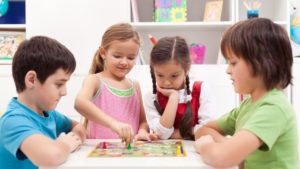When I was twenty-two years old, I wanted two things: 1. To be understood. 2. For people to think I was good at my job....Read more
Intelligence is understanding hard ideas, thinking through, finding answers to problems, and learning. When a child is seven years old, he has a good sense of time and can understand the difference between minutes, hours, days, and months. This shows that they are intelligent enough.
They could say what they thought and felt in a way that people outside of their close family could understand. It is normal for children to have trouble sounding out harder words when they read. By age seven, they have learned the basics of reading and writing, even if their spelling could be better.

A kid who is seven years old will usually be able to make more complex sentences as they get older. They will be able to speak more clearly and follow a long list of directions than they could when they were 6. They realize that some words can be taken in multiple ways.
Many parents can’t help but wonder if their kids are smart, growing up and developing at the right rate for their age. There are times when well-known symbols can help you find your way. But it’s important to remember that every child is different and special. Milestones are meant to be general guidelines, not rules that must be followed exactly. Read this article to learn more about how your 7-year-old is approaching a big milestone.
Related Article: Fun Things To Do With 7 Year Old Daughter
Social Learning for 7-year-olds
Intelligence can be determined through the social learning of your child. Social learning for 7-year-olds includes learning to put themselves in the shoes of their peers, realizing that losing or not getting their way is a normal part of life, and figuring out how they feel about wanting to fit in or be accepted by their classmates, teams, and friends.
Children this age are often ready to take their first tentative steps away from their parents and other caretakers. At this lovely age, the friends and hobbies they choose help them learn how to get along with others. At seven, a child’s growth is greatly helped by time alone, a decent and safe place to work through their feelings.
Children who are seven years old want to be closer to their peers and share their hobbies with them. These tasks will still help them read and understand how other people feel, but they will also give them some of the space for creative expression that they need so badly.
At age seven, kids can start making up their games to play with a small group of friends. This lets kids share parts of who they are in a fun and creative way with people they can count on for support.
Thinking and reasoning skills
Piaget says that thinking at age seven is characterized by logical processes like conservation, reversibility, and classification, which allow for logical reasoning
Your child’s cognitive growth, that is his thinking and reasoning skill has much to do with how intelligent he or she gets. By age seven, most children have good critical thinking skills and will keep a strong sense of how much time has passed. They know how many seconds, minutes, hours, days, weeks, months, and sometimes even years have passed.
Figure out which way to learn best fits your needs. For example, some kids like doing things they can do with their bodies, like a science project with color. Others would rather work quietly on their projects, like getting better at printing. Can solve simple math problems using real-world objects, like counting beads. When you think about worries and problems, you should only think about one thing at a time.
For critical thinking to work, it needs to start with a rock-solid base. Even though kids this age can’t do complex reasoning or make full-fledged cases, parents can still help them lay the groundwork for critical thinking by giving them advice and support.
How a seven-year-old child learns to be creative
When a kid turns 7, they enter a stage of development marked by excitement, creativity, and interest. As they learn more about the world, they are getting intelligent and more creative at using what they know to solve problems in their everyday lives. They still have a lot of faith in their skills and abilities in this area.
7-year-old children are very driven, continue to play with a lot of fantasy, enjoy a good task, and are well on their way to becoming experts in several fields because they can learn and remember things better. All of these things are important for creative thinking.
During this stage of growth, children start to think about how they compare to other kids their age and try to fit in with the rules of society. So, by the time they are 8, most kids will show signs of having less confidence and a big drop in their ability to think creatively, as measured by tests of divergent thought.
Every 7-year-old has a different way of learning
If we follow the work of Piaget and Vygotsky, that every child is special and has a personality, intelligence, and way of learning that are all their own. The child brings this unique quality to every new experience, and by taking part in these activities, they are actively learning new things.
Children learn from their interactions with others, like their peers, teachers, resources, and the world around them. They connect each new piece of knowledge to what they already know about the world. These connections are the basis for learning, and as children broaden their views and learn more about the world, they also bring more depth and complexity to these connections.
Word and sentence Development in 7-Year-Olds
If Vygotsky’s theory is used as a guide, it shouldn’t be surprising that children between six and seven often talk a lot. They like to tell jokes, talk about their thoughts, and talk about things in more detail. They start this time of rapid intelligence growth by learning anywhere from five to ten new words each day. Children start to understand why they use words, sentences and language and its goals at this age.
Even though most sound patterns are set by age 7, your child may still need help pronouncing words with the letter r or may say biscotti instead of spaghetti. At age six, some children may still say the /s/ sound like a /th/, but by age eight; it is expected that all speech sounds will have developed.
Instead of correcting your child when he says something wrong, you should show him how to say it right. If your child has trouble with many sounds, this could be an early sign that they will have trouble reading and writing. You should monitor how well they are doing in these areas.
IQ comparisons between people in the same family
Researchers have done a lot of tests to try to find the genes that are responsible for intelligence. Most of these studies have compared and contrasted the IQs of people in the same family, focusing on adoptive and biological brothers.
Genome-wide association studies, or GWAS, are a way that researchers have looked into the chance that certain parts of the human genome are linked to intelligence in other studies. Many people participated in these studies, and their whole genes were used.
Researchers haven’t found any genes that play a major role in why people are smarter or smarter than others. A person’s IQ is likely determined by many genes, each of which only plays a small part. Some things about intelligence, like remembering things and speaking well, are also influenced by genes.
A person’s IQ is likely determined by many genes, each of which only plays a small part. Some things about intelligence, like remembering things and speaking well, are also influenced by genes.
Curiosity and intelligence of 7 years old
Your 7-year-old child will be more willing and able to grow, learn, be curious and ask questions about the world if they have a beneficial interest in it. It helps kids develop their creativity and sense of imagination, which are important skills they need to be intelligent.
In today’s highly competitive educational environment, reading, writing, math, and science are hard skills that parents prefer to put the most stress on in their children’s education. Soft skills like curiosity and creativity, which make the academic understanding of the hard skills useful in the real world, are not included in this scenario because they are not considered hard skills.
A curious child is a child who dreams of being an astronaut. A kid who makes his or her unique clothes every morning. A child who wants to be an astronaut when they grow up.A young person who likes to draw and doodle. A young child who wants more than a one-sentence answer to a question like Why did the dinosaurs die? An older child who sets up a lemonade stand or helps a friend with chores to earn money for a gift.
Role of Play in Intelligence of 7 years old
Your child’s intelligence and cognitive development, that is, his or her ability to think, analyze, interact, remember, imagine, and predict what might happen next, are important reasons your child needs to play. Children this age are eager to learn how things work, an-*/d play is the best way.
When a child acts out things that interest them, like going to school with their toys, they use their imagination. This kind of play is also called make-believe in some places. Children can play make-believe on their own or with other kids. A child’s brain growth can be helped by doing things that require them to use their imaginations.
Is there some test to see how intelligent a seven-year-old is
The WISC Practice Test for 7-year-old children. The Wechsler Intelligence Scale for Children (WISC) test is often used as an entrance exam for gifted and talented programs so that skills and weaknesses in thinking can be found. A doctor usually gives the test, and each person takes it independently.
The starting point of the test is the main thing that affects how it is given to children of different ages. Older children will start the test with more difficult parts of each subtest. The most current version, the WISC-V has better interpretive capabilities, is easier to use and works better in practice. The most common way to determine a person’s intelligence level is to have them take an intelligence test, which measures how well they can think.
These tests are usually regulated, meaning everyone gets the same questions, scores, and meanings. During an intelligence test, memory, verbal and nonverbal reasoning, the ability to answer problems and other cognitive skills are all looked at.
How high should a child’s IQ be if he or she is seven years old
According to the studies, A 7-year-old is between 10 and 30 on the intelligenc—e scale. This is because education and information are always getting better. As kids grow and their brains keep growing, the standards for a normal level of cognitive ability change.
Contrary to that, a child’s IQ test can only give a good idea of how much they can do based on how much they understand. Other parts of a child’s nature, like ambition and persistence, determine if he or she will succeed.
My child is seven years old. Can he or she get more intelligent
You can raise your seven years old child’s intelligence quotient (IQ). You can increase a child’s intelligence by giving them different intellectual challenges and letting them figure out how to understand, learn, and answer puzzles on their own. The child’s IQ will go up because of this.
Playing small educational games along the way, like asking them to name or count things, is a great way to help them learn even more. Roche says, If you do this over a few years when your child is young, you can raise his or her IQ by six points.
Does intelligence have something to do with genes
Intelligence is a complex trait affected by genetics and the environment, just like most other aspects of how people act and think. The chance of inheriting intelligence goes up in a straight line, from about 20% in childhood to 40% in adolescence to 60% in adults. Heritability goes down as a person ages.
Some data suggests that a trait’s chance of being passed down can rise to as high as 80% in later adulthood but then drop to around 60% after age 80.
What are some signs that a child has a high level of intelligence
Children with a high IQ are naturally curious and good at noticing things. They also tend to ask a lot of questions. Being able to think generally while being creative and coming up with new ideas.
The early stages of learning motor skills like balance, coordination, and moving. A child with intelligence enjoys learning new things, whether new hobbies or ideas. He strongly desires to do things that challenge and stimulate the mind. He can learn quickly about new things. He can quickly take in both new and complicated knowledge. He has a strong desire to learn a lot about some things.
CONCLUSION
Intelligence is a quality with many different parts. It can be defined as the ability to learn, understand, apply information, reason deductively, and solve problems. Some cognitive skills are memory, vision, attention, solving problems, and thinking by inference.

Keep in mind that your 7-year-old child’s intelligence will depend on a lot of different things. There will always come a time in a child’s life when they have learned everything they can. Even if you don’t think your child is intelligent, you should still help him grow his mind. You should be his best friend and help him reach his goals when needed.

When I was twenty-two years old, I wanted two things: 1. To be understood. 2. For people to think I was good at my job. As a first time founder, I remember feeling under-qualified. I felt like an impostor—and it showed. I struggled to communicate my value in a way that my colleagues and potential investors could understand. I realized I needed to clarify my message and use social media as a tool to help me build my personal brand. This would help me look more credible, I thought. So I got to work. I updated my social media profiles, built a personal website, and began sharing my story online. The more content I shared, the more confident I became. And the more confident I became, the more credible I appeared. Now i am writing blogs for madeforkids.co.uk on different topics on kids.
- Latest Posts by Anna Vatuone
-
What Are The Uses Of A Drone
- -
What Are The Uses Of Playhouse
- -
How To Get A Child To Warm Up To You
- All Posts
